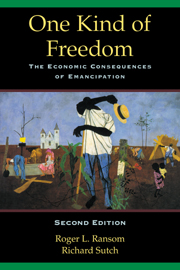Book contents
- Frontmatter
- Contents
- Preface
- Preface to the new edition
- Acknowledgments
- A note to the reader
- Chapter 1 What did freedom mean?
- Chapter 2 The legacy of slavery
- Chapter 3 The myth of the prostrate South
- Chapter 4 The demise of the plantation
- Chapter 5 Agricultural reconstruction
- Chapter 6 Financial reconstruction
- Chapter 7 The emergence of the merchants' territorial monopoly
- Chapter 8 The trap of debt peonage
- Chapter 9 The roots of southern poverty
- STATISTICAL APPENDIXES
- DATA APPENDIX
- Epilogue
- A Bibliography of Literature on the South after 1977
- Notes
- Bibliography
- Index
Chapter 8 - The trap of debt peonage
Published online by Cambridge University Press: 05 October 2013
- Frontmatter
- Contents
- Preface
- Preface to the new edition
- Acknowledgments
- A note to the reader
- Chapter 1 What did freedom mean?
- Chapter 2 The legacy of slavery
- Chapter 3 The myth of the prostrate South
- Chapter 4 The demise of the plantation
- Chapter 5 Agricultural reconstruction
- Chapter 6 Financial reconstruction
- Chapter 7 The emergence of the merchants' territorial monopoly
- Chapter 8 The trap of debt peonage
- Chapter 9 The roots of southern poverty
- STATISTICAL APPENDIXES
- DATA APPENDIX
- Epilogue
- A Bibliography of Literature on the South after 1977
- Notes
- Bibliography
- Index
Summary
More evils have come to the farmers of the State on account of the mortgage and lien bond system than from any other, and indeed from every other source. It has proved a worse curse to North Carolina than drouths, floods, cyclones, storms, rust, caterpillars, and every other evil that attends the farmer.
W. N. Jones, Commissioner, Bureau of Labor Statistics, North Carolina, First Annual Report of the Bureau of Labor Statistics (Raleigh: Josephus Daniels, 1887), p. 76.Contemporary critics insisted that the monopoly power of the merchant was used not only to exploit southern farmers but to control southern agriculture. The specific charge was made that the merchant forced the farmer into excessive production of cotton by refusing credit to those who sought to diversify production. Charles Otken, one of the most strident critics of the South's merchandising system, insisted that:
For years a class of merchants encouraged their credit customers to raise cotton exclusively, or very largely. They reasoned very naturally and very logically, that, the more goods sold to farmers, the greater their sales and the greater their aggregate profits…. The debts of the farmer bound him to cotton. He was powerless.
Otken quoted Henry Grady, who, writing in 1889, had bluntly described how this was done: “When he [the farmer] saw the wisdom of raising his own corn, bacon, grasses, and stock, he WAS NOTIFIED that reducing his cotton acreage was reducing his line of credit.”
- Type
- Chapter
- Information
- One Kind of FreedomThe Economic Consequences of Emancipation, pp. 149 - 170Publisher: Cambridge University PressPrint publication year: 2001



